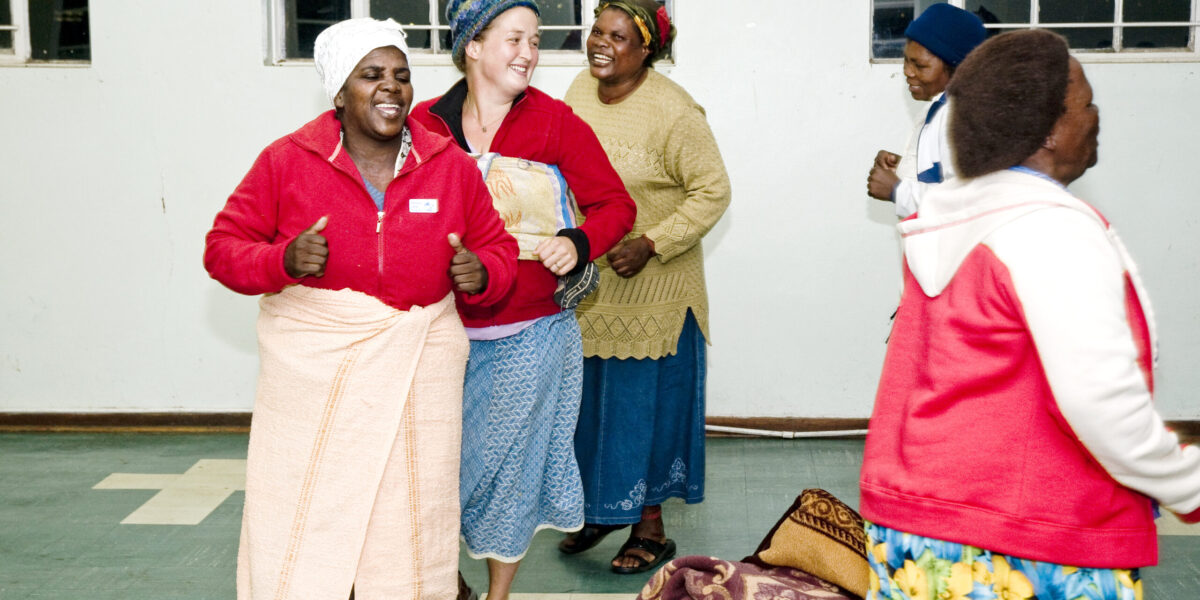NEWTON, Kan. (Mennonite Mission Network) – Succession is part of the grand biblical narrative, Anna and Joe Sawatzky told Mennonite Mission Network board members and supporters June 7 in Newton, Kan., as they reported on their nine-year assignment in South Africa that focused on empowering leadership at Bethany Bible School in Mthatha.
The history of God’s interaction with people guided the Sawatzkys’ ministry. They described how, at the insistence of the Almighty, Moses handed over leadership of a nomadic band of immigrants to Joshua. Elisha picked up the fallen mantle of Elijah. And so on through the centuries, until Jesus, at the end of his human life, gave power to the church to act as his body.
“Succession is the will of God,” Joe Sawatzky said.
Anna and Joe Sawatzky gave examples of people who picked up a vision from a predecessor and brought it to glorious completion. Joshua led a wandering people into the Promised Land where they grew into the powerful nation of Israel. King David desired to build a splendid temple to honor God, but it was his son and successor, Solomon, who fulfilled his father’s dream. In John 14:12, Jesus told the church as he passed on his ministry, that through the power of the Holy Spirit, they would do even greater things than he had done.
Anna and Joe Sawatzky and their four sons continued the 30-year legacy of Mennonite mission workers working alongside African church leaders in Eastern Cape Province. Bethany Bible School, a teaching ministry in the Xhosa language for African-Initiated Churches, opened its doors in 1982, when Africa Inter-Mennonite Mission accepted an invitation from the Transkei Council of Churches.
During the apartheid era, South Africa’s government refused visas to Mennonites, fearful of our denomination’s biblically based call to justice. So, Mennonites worked just outside the country’s borders in the quasi-independent black homeland, Transkei. Now, Africa Inter-Mennonite Mission, Mennonite Church Canada, and Mennonite Mission Network collaborate in ministry in South Africa.
The Sawatzky family considered their whole lives to be mission. Whether she was walking through town with a baby on her back in the African manner, or worshiping in church, there was never an off-time, Anna Sawatzky said.
“Our ministry of presence brought everything together. [A common Mission Network phrase] ‘Be the Gospel’ is great. It’s a way of being with people, showing respect at every level,” she said.
Joe Sawatzky described the couple’s life in South Africa as accompaniment-style ministry that responded to invitations.
“If they wanted me to preach, I would preach. If they wanted me to sit there and observe, I did. If they wanted us to sleep in their home, we did. I think that’s the best way to work.”
Joe Sawatzky said that even though they marched to the beat of other people’s drums, they could still be themselves. When he was given the pulpit, he preached on Anabaptist themes.
“Some of the things that were already a part of me, connected with the way [South Africans] did things, and that mix created something new. There was freedom in those moments to become something new or beyond what I had been before,” Joe Sawatzky said.
Thompson Adonis, archbishop of Reformed Church of Christ, worked with early Mennonite mission workers to lay the foundation of Bethany Bible School. He commended Anna and Joe Sawatzky for continuing in the footsteps of their predecessors.
“Mennonites emphasize all the time that they are here in South Africa not to plant churches, but to equip believers to do their church ministries better, to be good stewards. That’s what the Sawatzkys did,” Adonis said. “They encouraged us to serve God in an African way.”
The Sawatzky couple and a committee of student leaders established a 24-course curriculum for Bethany Bible School. Teaching took place during weekend conferences scheduled over a four-year period. Each year, three additional skills-based workshops, such as learning community development principles, or discovering effective responses to the HIV-AIDS epidemic, helped students find ways to address social issues.
While recognizing that only congregations can ordain people for ministry, Bethany celebrated the graduation of 18 students, who successfully completed all 24 courses. In the following two years, 25 more students have graduated.
 Download full resolution image.
Download full resolution image.As Bethany Bible School’s leadership committee prepared for the Sawatzky family’s departure, they named a coordinator, Reuben Mgodeli.
The Sawatzkys highly affirmed Mgodeli, describing him as someone called by God to lead the ongoing ministry of Bethany, and as a person endowed with authority, passion for following Jesus, spiritual discernment, and energy for challenges.
Anna Sawatzky remarked on Mgodeli’s tireless quest for reconciliation.
“His zeal is tempered with a patient spirit,” Joe Sawatzky said.
Joe Sawatzky and Mgodeli mutually mentored each other as they studied the Bible together. During the past year, they met at least once weekly to discuss and prepare for Bethany’s leadership transition.
Mgodeli said that his relationship with the Sawatzkys was like that of Aquila and Priscilla who served alongside the Apostle Paul.
“The way they loved each other and worked with each other at Bethany Bible School and in their house made me do that in my house, treating my wife as an equal companion with me, assisting her in our house chores. [I, now,] work together with my wife in our church business and in raising our children,” Mgodeli said.
Anna and Joe Sawatzky’s lifestyle affected so many people, Mgodeli said, mentioning especially their humility and their love for God’s people.
“They even ate with us, and danced with us,” Mgodeli said. “We gave them Xhosa names, Luxolo [Father of Peace] and Noxolo [Mother of Peace]. Those names show that they were people of peace.”
###
For immediate release
Mennonite Mission Network, the mission agency of Mennonite Church USA, leads, mobilizes and equips the church to participate in holistic witness to Jesus Christ in a broken world. Media may contact news@mennonitemission.net.







